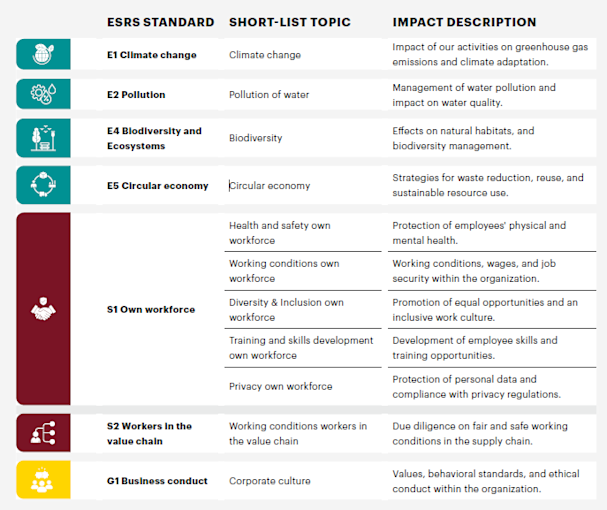Please select the country where you would like to receive containers.

The CSRD and the ESG Omnibus Regulation: What Do They Mean for the Container Industry?
At CARU Containers, sustainability is not a new topic. With our focus on circular solutions and no empty shipping, we have long been working to reduce our environmental impact. But with the arrival of the Corporate Sustainability Reporting Directive (CSRD) and the complementary ESG Omnibus Regulation, the legal landscape is changing. What do these new rules mean for container companies? And how is CARU preparing? We dug into the details.
What is the CSRD?
The Corporate Sustainability Reporting Directive (CSRD) is a European directive that requires companies to report on their performance in the areas of environment, social issues, and governance (ESG). This means companies must disclose information on:
Environment: such as energy use, CO₂ emissions, waste flows, and the impact on nature and biodiversity.
Social: including working conditions, human rights, equality, and workplace safety.
Governance: how the company is run, including ethical business practices, internal controls, executive compensation, and supervisory structures.
The CSRD replaces the earlier Non-Financial Reporting Directive (NFRD) and applies to far more companies than before. Reports must comply with the European Sustainability Reporting Standards (ESRS) and follow the principle of double materiality:
Impact materiality: the company’s impact on people and the planet.
Financial materiality: how sustainability issues affect the company’s financial position.
The CSRD will be rolled out in phases. Reporting obligations begin in the 2024 financial year for the largest companies. Others will follow in later years, depending on size and stock market listing. CARU Containers is expected to fall under the so-called second wave of the CSRD. This group includes large companies that would be required to report on sustainability performance from the 2025 financial year.
What Does This Mean for Companies?
The CSRD shifts sustainability from ambition to obligation. This requires:
Clear and actionable ESG policies
Reliable data and systems
Transparency towards customers, financiers, and other stakeholders
International companies have always had to navigate different national regulations. The CSRD aims to create one consistent framework across Europe, but this still requires serious preparation.
What Is CARU Containers Doing?
In preparation for the expected reporting obligation under the CSRD, CARU Containers conducted a double materiality assessment (DMA) in 2024. This assessment identified which sustainability issues are material to both our stakeholders and our operations. The evaluation followed the two dimensions of double materiality: the societal impact of CARU and the potential influence of ESG topics on our strategy and business outcomes.
The results of this analysis are presented in the table below and have since served as the foundation for our sustainability strategy and reporting approach. We are committed to reviewing this materiality annually and to reporting on it transparently.

The Impact of the ESG Omnibus Regulation
In February 2025, the European Commission presented the proposed ESG Omnibus Regulation, aimed at simplifying and refining the implementation of the CSRD. One of the most significant changes is the revision of the scope: under the proposal, companies with fewer than 1,000 employees would be exempt from the reporting requirements that were originally set to apply from the 2024 financial year. For companies with more than 1,000 employees, those originally in the second wave, the reporting obligations are postponed by two years. In addition to redefining the scope, the Omnibus Regulation introduces several simplifications to give companies more time and space to prepare, including:
A simplification of the reporting requirements, including the postponement of sector-specific standards
Limits on requests for sustainability data from small suppliers, to reduce the administrative burden on SMEs
These changes reflect the European Commission’s aim for a practical and proportional implementation of sustainability reporting, without compromising the core objectives of the CSRD. Reporting from Ambition, Not Obligation Since CARU Containers is below the 1,000-employee threshold, we are currently exempt from the formal CSRD reporting requirements under the proposed rules. Nonetheless, CARU Containers remains fully committed to transparent and meaningful sustainability reporting. The topics identified in our double materiality assessment will form the foundation of our ongoing reporting efforts. We do not see the exemption as a reason to ease off, but rather as an opportunity to further professionalize our sustainability approach. By strengthening our data systems, further integrating policy, and consistently monitoring progress, we are building a solid base for future reporting obligations and creating value for our stakeholders today.
CARU’s Approach:
Annual reporting on our impact regarding the material ESG themes
Continued development of data collection and internal sustainability processes
Active stakeholder engagement in policy and decision-making
Open and transparent communication about our goals, progress, and results
CARU Containers is preparing for a future in which sustainability is not only expected but also measurable and verifiable. For us, transparency is not a goal in itself, it is a core part of who we are and how we aim to create lasting value. In Conclusion The introduction of the CSRD and the accompanying ESG Omnibus Regulation marks the beginning of a new era in sustainability reporting. At CARU Containers, transparency about societal impact has long been a key part of our operations. The CSRD has especially encouraged us to deepen our processes, improve data quality, and professionalize our reporting structures.
Although we are not currently subject to formal reporting obligations, we are deliberately choosing to proactively report on the sustainability issues that matter most to us and our stakeholders. In doing so, we continue to build a future-proof organization with sustainability at the heart of our strategy.

Want to learn more about our sustainability approach or collaborate on circular solutions? Feel free to get in touch with Robine! [email protected]






